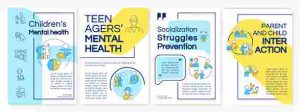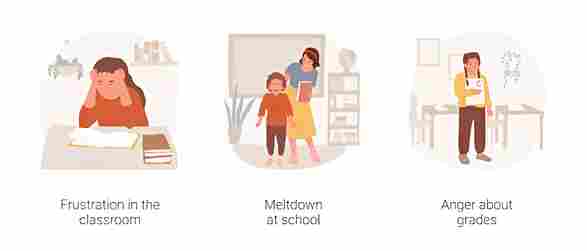Homeschooling is something that we have seen an increase in over the last several years with more and more parents choosing to school their children from home. But what about the child’s mental health consequences of homeschooling?
Homeschooling is becoming an increasingly popular choice for many families due to its ability to target the specific learning challenges of any child, remove some stress, and improve emotional health.
We will go over homeschooling how it affects mentally to a child versus conventional education and what it does in the initial years for future impact on emotional & psychological development.
Homeschooling – What is it and How Does It Work?
In simplest of terms, homeschooling is teaching your child at home instead of sending them to a traditional school. The curriculum is typically taught by parents or hired educators. Homeschooling can take many forms, such as online resources, unique lesson plans, and groups for social learning.
Types of Homeschooling Models:
-
- Structured Model: Similar to school-like hours with set subjects.
- Unschooling: Child-led learning focusing on interest-based education.
- Hybrid Homeschooling: Combination of home education with online learning or local classes.
An important aspect of homeschooling is the freedom to design a clean environment in a way that is conducive to your child, which begs the question of mental health.
Child’s Mental Health

The CDC describes mental health in children as a child’s ability to function well and develop emotionally, psychologically, behaviorally, and socially. Mental health influences the way kids think, feel, and act, and it is as important to children’s well-being as physical health.
Physical and emotional well-being helps to make children resilient, with the skills they need to form strong relationships, roll with changes, and cope when things get tough.
Foundations of A Child’s Mental Health:
-
- Emotional regulation: Ability to control your emotions.
- Cognitive Ability: To stimulate the mental abilities of learning and solving problems healthily.
- Social Integration: Creating, developing, and sustaining supportive social connections.
Just as it is for children who attend traditional school, a balanced mental health state is essential for thriving in homeschooling. However, the kind of education a child is provided deeply influences their emotional health.
What is the Influence of Homeschooling on the Mental Health of a Child?

Depending on how it is managed, homeschooling can affect a child’s mental health both positively and negatively. Moreover, homeschooling tailored to the individual needs of each child can mean that children can learn without many of the factors that cause high levels of stress in traditional school environments like peer pressure, bullying, and academic competition.
They offer a way for children who may struggle with social anxiety or other emotional health issues to find refuge.
Potential Positive Impacts:
-
- Less Anxiety- Have a Peaceful environment: Children from competitive academic stress.
- Confidence: The opportunity to concentrate and improve areas with tailored education.
- More Emotional Support: Homeschooling usually offers more attention, so children feel heard and less like just another face in a crowd.
Potential Negative Impacts:
-
- Limited Social Interaction: Without proper socialization, students schooled at home may miss important bonding moments that can affect their social growth.
- Hindrances due to overprotection: A regulated environment at a home could make the kid dependant on parents hence hindering its versatility.
What are the Psychological Advantages of Homeschooling?

If homeschooling is done in the right way, it can offer many psychological benefits that help to result in the good mental health of your child. Research has shown that often homeschooled children are more likely to be able to cope and develop resiliency characteristics during challenging times in their lives.
Homeschooling also offers a more conducive learning environment to the psychological needs of students.
-
- Personalized Learning Paces: Kids can learn at a speed that suits them without being tested into one box or tie-fitting into a standard academic timeline.
- Better Emotional Health: Because homeschooling focuses on the child and not a set of standards, the emotional self is just as important as if not more so than their academics.
- Better Parent-Child Relationships: Through homeschooling, this would enable the parents to nurture closer relationships with their children which can at least aid in better psychological well-being of a child.
While homeschooling, they must take extra care to maintain a balance between scholastic experiences and normal social interactions so as not to impede on holistic psychological growth of a child.
How ACE Education Keeps A Check On Child’s Mental Health Along With Homeschooling?
We are resolved to provide the best out-class home-schooling services, which not only deliver merit but also take care of the mental health of your child as well. With personalized curriculums, ACE Education seeks to ensure equipping every child with all-around emotional and psychological regulation gears for a healthy learning atmosphere.
- Customized Learning Plans: To suit the learning style and mental health needs of each child, ACE Education has customized learning plans,
- Mental Health Resources: ACE Education guides parents to manage the emotional health of their child by incorporating mental health support within their homeschooling programs.
- Group Learning and Socialisation: We also strictly follow the norms of learning with peer participation as it is considered a strong base for social development; it not only encourages group academic synergies but in a broader aspect meaningful interaction helps children carve their cardinal abilities with mental balance.
FAQs
What is the Biggest Disadvantage of Homeschooling?
Homeschooling can be an environment to provide children the intended nurturing and flexibility however a major limitation is that it may isolate them. Without this, homeschooled children may lack fundamental social learning experiences and even develop poor social skills or mental health problems.
The solution to this, however, is making sure homeschool students have some extracurricular activities and peer groups.
Does Homeschooling Improve Mental Health?

Studies show that for many children, homeschooling is not only better for a child’s mental health due to anxiety, bullying or the demands of a regular school whilst outperforming in academic areas. But it hinges on the capacity of her family to educate and socialize.
Has there been research on the mental health outcomes of formerly homeschooled adults?
Studies have indeed shown that adults who were homeschooled tend to self-report positive mental health outcomes (specifically in terms of their social strengths, including the ability to stick up for themselves) compared to other adults. The quality of the homeschooling and the level of socialization also can lead to different outcomes.
What Effects Will Homeschooling Later in Life Have?
Home-schoolers generally have stronger family ties and might well perform better in situations that value self direction and initiative. On the flip side, research also shows that in later life there may be some difficulty adapting to social settings if homeschooling did not provide enough of an emphasis on socialization.
Conclusion:
Homeschooling can make a big difference in the child’s mental health, for better or for worse. It can also reduce stress and anxiety, build self-esteem, and enhance emotional bonds by virtue of the more individualized, flexible learning environment.
But parents must also be careful to address their child’s need for socialization and independence to promote healthy mental and emotional development. Homeschooling, when done right can be an amazing way to help a child grow mentally and emotionally.
